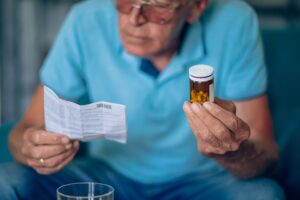Medical Review by Jennie Stanford, MD, FAAFP, DipABOM
Summary:
- Erectile Dysfunction (ED) is a prevalent condition impacting over half of all men at some stage, affecting self-esteem and relationships. However, it is highly treatable.
- Normalizing conversations about ED is crucial for breaking societal stigmas and encouraging open discussions about sexual health without shame.
- ED can be caused by psychological and physical factors, including stress, anxiety, depression, cardiovascular diseases, and hormonal imbalances.
- Seeking medical advice for ED is essential when experiencing persistent erection issues or reduced sexual desire. Healthcare professionals can offer confidential and sensitive support.
Erectile dysfunction is common (but highly treatable)
Erectile dysfunction (ED) will affect more than half of all men at some point in their lives. While this condition can have a significant impact on your self-esteem or relationships with others, it’s not all bad news—ED is treatable, and the more you know about it, the easier it is to find effective help.
Why normalizing conversations about ED matters
Despite its prevalence, discussing ED openly remains somewhat taboo. This stigma can make it harder for men to access the healthcare they need, since ED can also signal other health concerns.
By normalizing conversations about ED, men who experience it can find better help more easily.
Communicating about sexual health
For men with ED to feel comfortable seeking support, conversations about sexual health need to happen without shame or judgment. Fostering open dialogues with partners, friends, or healthcare professionals helps promote a better understanding of ED’s impact and how to address it.
Why ED is often an uncomfortable conversation
Stigma surrounding ED often stems from long-standing societal norms and misconceptions. Many view ED as a sign of diminished masculinity or aging, but this is far from the truth. ED can affect men at any age and for a variety of reasons.
How erections happen (& what gets in the way)
Understanding the mechanisms behind achieving and maintaining an erection is essential for treating erectile dysfunction properly. This process involves both physical and psychological elements.
Physiological process of erection
An erection is a result of a complex sequence initiated by sexual arousal. It starts in the brain, then moves to the nerves and blood vessels of the penis.
- Upon arousal, the brain sends signals to the penile nerves.
- These nerves respond by increasing blood flow into the penis, filling two chambers known as the corpora cavernosa.
- As these chambers fill with blood, the penis becomes rigid.
- The rigidity is maintained as the muscles in the penis contract, trapping the blood in the corpora cavernosa.
Factors contributing to ED
Erectile dysfunction can also arise from psychological or physical factors.
Psychological contributors that can impede the brain’s ability to trigger an erection include:
- Stress
- Anxiety
- Depression
Physical aspects include:
- Cardiovascular diseases affecting blood flow
- Neurological disorders impairing nerve function
- Hormonal imbalances
Certain lifestyle factors can make ED more likely. These include:
- Smoking
- Excessive alcohol use
- Poor diet
See Also: does masturbation cause erectile dysfunction?
Recognizing all of these contributors is crucial for understanding and treating ED. When you consult with a doctor about your problem, they’ll typically ask you questions about these factors so they can figure out why you’re experiencing ED and determine the best course of action.
It’s also important to note that ED usually has multiple overlapping causes. This means addressing ED often requires a comprehensive approach.
When to seek medical advice
Erectile dysfunction isn’t just a challenge to your sexual life; it can also be a sign of underlying health issues. Recognizing when to seek medical advice can help you manage ED symptoms, but can also be vital for maintaining your overall health.
Consult a healthcare professional if you experience:
- Persistent difficulties achieving or maintaining an erection
- Reduced sexual desire
- Complications arising from existing ED medications
Don’t let hesitation or embarrassment delay your consultation. Healthcare providers are trained to handle these concerns with sensitivity and confidentiality. A professional evaluation can uncover any underlying health conditions, ensuring that you receive the most appropriate and effective treatment.
Lemonaid Health’s virtual consultations for ED
At Lemonaid Health, we understand the need for discretion and convenience when dealing with sensitive health issues like ED. We provide virtual consultations with online medical practitioners based in the United States.
The benefits of online consultations
- Feel more comfortable by accessing help from the privacy of your home
- No need to travel to in-office appointments
- Speak with qualified doctors in the US
ED treatment options: an overview of your options
Treating ED effectively requires a comprehensive approach tailored to each individual’s needs. This often involves some combination of medications, therapies, and lifestyle changes.
Remember that every individual’s experience with ED is unique. What works for one person may not be effective for another.
ED medications
Common medications for ED include Viagra®, and Cialis®, which promote blood flow to the penis during arousal by blocking the enzyme PDE5 before it can break down the hormone cGMP (which helps the penile muscles relax).
Learn more: Viagra® guide: uses, benefits, side effects, & more
Therapy for ED
In some cases, therapy may be recommended to address psychological factors like stress, anxiety, or depression. Current interventions may include:
- Behavioral interventions
- Cognitive behavioral therapy
- Hypnosis
- Mindfulness-based interventions
Lifestyle changes
A healthy lifestyle is not only vital for general health but also plays a significant role in maintaining sexual well-being. The following lifestyle choices can all have a profound impact on managing and preventing ED:
- Diet: A balanced diet rich in fruits, vegetables, whole grains, and lean proteins can improve cardiovascular health, crucial for good blood flow.
- Exercise: Regular physical activity improves blood circulation, boosts energy levels, and enhances mood—all essential for a healthy sex life.
- Stress Management: Chronic stress can interfere with sexual arousal and performance. Techniques like meditation, deep breathing exercises, and yoga can help manage stress levels.
- Adequate Sleep: Lack of sleep can affect libido and sexual performance. Aim for 7-9 hours of quality sleep each night.
- Limit Alcohol and Quit Smoking: Both smoking and alcohol can contribute to ED. Excessive alcohol can lead to ED, while smoking damages blood vessels, affecting blood flow to the penis.
Partner involvement & communication
Dealing with ED is not just a solo journey. Talking to a medical professional and communicating with your partners often leads to better understanding, empathy, and stronger relationships.
How to communicate with your partner about ED
Talking with your partner can provide key support for ED. Here are some of the ways in which it can benefit you both:
- Discussing ED: Openly discussing ED with your partner can alleviate anxiety and build trust. It’s important to express how ED affects you and to listen to your partner’s perspective.
- Educating Together: Learning about ED together can help you and your partner understand the condition’s complexities and treatment options.
- Emotional Support: Emotional intimacy and support are vital. Encourage each other to express feelings and concerns.
- Exploring Alternatives: Together, explore other forms of intimacy and sexual expression. This can help maintain a fulfilling sexual relationship while managing ED.
Viagra® is a registered trademark of Pfizer Inc. Cialis® is a registered trademark of Lilly ICOS LLC.












